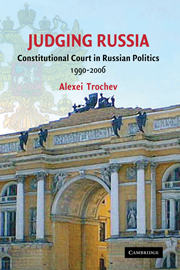Book contents
- Frontmatter
- Contents
- List of Figures and Tables
- Acknowledgments
- Abbreviations
- Notes on Transliteration
- 1 Introduction: Three Puzzles of Postcommunist Judicial Empowerment
- 2 Nonlinear Judicial Empowerment
- 3 Making and Remaking Constitutional Review, Russian-Style
- 4 Russian Constitutional Review in Action (1990–1993)
- 5 Decision Making of the 2nd Russian Constitutional Court: 1995–2006
- 6 The Constitutional Court Has Ruled – What Next?
- 7 The 2nd Russian Constitutional Court (1995–2007): Problematique of Implementation
- 8 “Tinkering with Judicial Tenure” and “Wars of Courts” in Comparative Perspective
- 9 Conclusion: Zigzagging Judicial Power
- Appendix
- Bibliography
- Statutes and Decrees
- Court Decisions
- Index
1 - Introduction: Three Puzzles of Postcommunist Judicial Empowerment
Published online by Cambridge University Press: 25 July 2009
- Frontmatter
- Contents
- List of Figures and Tables
- Acknowledgments
- Abbreviations
- Notes on Transliteration
- 1 Introduction: Three Puzzles of Postcommunist Judicial Empowerment
- 2 Nonlinear Judicial Empowerment
- 3 Making and Remaking Constitutional Review, Russian-Style
- 4 Russian Constitutional Review in Action (1990–1993)
- 5 Decision Making of the 2nd Russian Constitutional Court: 1995–2006
- 6 The Constitutional Court Has Ruled – What Next?
- 7 The 2nd Russian Constitutional Court (1995–2007): Problematique of Implementation
- 8 “Tinkering with Judicial Tenure” and “Wars of Courts” in Comparative Perspective
- 9 Conclusion: Zigzagging Judicial Power
- Appendix
- Bibliography
- Statutes and Decrees
- Court Decisions
- Index
Summary
At the beginning of the new millennium, when the dust of the postcommunist transition had settled, the dynamics of judicial empowerment in the area of the former Soviet domination held many a surprise. Whether a democracy or not, each postcommunist country had a functioning constitutional court, a new judicial body armed with the power to revoke laws found to be in violation of constitutional provisions. However, just as political regimes varied in the ex-Soviet world, the young constitutional courts also varied in terms of their real judicial power. Some courts immediately started to rule against the powerful but were eventually tamed by the rulers (Russia in 1993 and Hungary in 1999). Some courts were brave enough to impeach popularly elected presidents (Russia and Lithuania), to bar popular politicians from running for the presidency (Bulgaria), or to repeal constitutional amendments (Moldova). Others (Serbia, Georgia, Ukraine, and Kyrgyzstan) simply watched, as mass peaceful protests over fraudulent elections overthrew powerful presidents during so-called colored revolutions of 2000–2005. To nobody's surprise, constitutional courts in “autocracies” (Belarus and Uzbekistan) tended to offer nonbinding recommendations to powerful executives.
What is more surprising is that the postcommunist constitutional review appears to stick to nondemocratic polities. Ruling elites in Albania and Belarus, Kazakhstan and Tajikistan, Russia under President Putin and Slovakia under the Meciar government, create these constitutional courts, then, in a matter of a few years, attack them and yet keep these tribunals operating. Even more surprising is the persistence of accessible constitutional review in nondemocracies.
- Type
- Chapter
- Information
- Judging RussiaThe Role of the Constitutional Court in Russian Politics 1990–2006, pp. 1 - 18Publisher: Cambridge University PressPrint publication year: 2008

